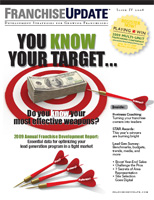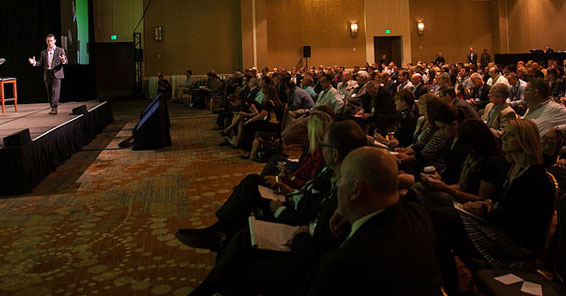The Forecast Calls for Pain: This Economic Downturn May Be Slow To Turn Around
The daily flurry of bad economic and financial news recently has made it difficult to focus on time periods beyond weeks, days, or even hours. However, I'll try to put things in perspective for the franchise community and offer both a forecast and some suggestions on how we can make the best of 2009.
The Perspective
Since the 1970s, the U.S. has averaged about one big economic crisis per decade. Each time, economic issues triggered serious financial issues--high interest rates in the 1970s, the S&L crisis in the 1980s, and the financial downdraft from throwing investments at anything that had the word Internet in it in the 1990s. Each time, it affected consumer and business access to capital. And each time it took several years to recover from the crisis. In fact, we have been conditioned to expect a downturn to last only a couple of years. (Remember earlier this year a lot of the economic talk was around when the "bounce" would happen; some said in late 2008, others argued in early 2009).
This time around the differences are more striking than the similarities to the past downturns. This crisis has been initiated, to a large extent, by financial rather than economic issues. The financial instruments that were created are so complex it is difficult to understand the underlying risks. The financial tentacles reach around the globe into both public and private investors. And the sheer size of the dollars involved is larger than in any previous crisis.
Between 2002 and 2007, historically low real interest rates encouraged ever more creative and complicated financial instruments. This combination stimulated economic activity, essentially compressing into six to seven years what likely would have taken about a decade. It was akin to giving your child sugar: greater activity is stimulated but it is not sustainable.
The Forecast
Even without the financial crisis we now face, economic activity was heading into a slower period. With the financial crisis, economic activity is going to be very choppy for a while. I believe that an optimistic scenario is a return to more normal economic activity some time in 2010 at the earliest. I say this because we will need at least all of 2009 to sort out the implications of the financial mess that has been created on a global level. The planned government bailout certainly will help calm markets and ease the financial crisis but it won't eliminate the high levels of consumer debt. That will take some time to digest.
Uncertainty is accompanied by periods of wide swings in the markets, which in turn cause wide swings in consumer expectations. Uncertainty also makes lenders hesitant. What we have witnessed so far this year in the financial markets has been unprecedented in its scope and impact. We are going to see an unprecedented level of de-leveraging, simply because we have seen an unprecedented level of leveraging since 2001. Between 2002 and 2007, financial sector borrowing grew a very rapid average of 10 percent per year; it's now about half that. Household borrowing grew at an average annual rate of 11 percent; it's now about 3.5 percent. Both far outpaced overall economic growth. This was not sustainable. In the past year, financial institutions around the world have written off more than $400 billion in assets; a lot more may be coming. Until this works its way through the markets, consumers will be hesitant to borrow and banks will be hesitant to lend.
It's hard to predict which way interest rates will go, given all the recent issues. My best guess is that funding the enormous cost of the bailout, on top of the large and growing government deficit, will cause rates to rise, along with inflation and taxes. However, we have managed to keep rates relatively low so far at the cost of a weak dollar. If that continues, we will see more foreign franchisors target the U.S. market at a time when we are seeing less new brand development domestically.
The franchise community is going to see a rise in closed units as higher operating costs root out inefficient and underperforming units. With this rise will come more litigation.
We're also going to see increased M&A activity, both at the brand level and at the franchisee/unit level. Private equity is still around; it is just going to be more opportunistic. Experienced franchisees will be more in demand across sectors, not just among brands within a sector.
The Implications
In both good times and bad there are winners and losers. Here are some things that can put you in the win column.
First, recognize that access to capital is likely a bigger constraint than finding qualified franchisees or new retail customers. This crisis primarily is financially driven. Perhaps the biggest implication is that access to credit will continue to be tight and much more difficult than it was a couple of years ago.
Rising unemployment will help with employees, but not as much as with prospective franchisees. In past downturns, many mid- and late-career people sought work alternatives. They had two things that many of the people getting laid off now don't have: business experience and reasonably high personal net worth. The twin pillars of financial well-being--401(k)'s and home equity--increased Baby Boomer willingness to risk one because they had the other. People don't have that same feeling now, whether real or perceived.
Further, demographics are working against a continuation of the kind of unit growth momentum we experienced in the past 10 years. Baby Boomers are entering retirement, there are a lot fewer Gen Xers than Baby Boomers, and Gen Yers, though large in number, have less experience and capital.
Unit expansion for experienced franchisees will be tough, but for prospective new franchisees development will be much tougher simply because the capital access bar has been raised. As a result, we will see a growth in multi-brand franchisees over the next few years as bankers perceive lower performance risk associated with experienced franchisees.
What All This Means
If capital access is arguably the biggest issue, you need to make it easier for a financial institution to say yes. How? Think like a banker does about risk--they're not just financing a franchisee, they're also underwriting the brand and system. In this environment, if your brand does not already have loan experience with a bank, the bank doesn't have as strong a willingness to seek you out. Even if you have some history with a particular bank, you need to be aware of your system's loan performance history. Finally, even if you have a good performance history with a bank, that bank may determine it has too much loan concentration with your brand. In this environment, you need to pursue banks armed with information that will make their underwriting job easier.
What are the types of things bankers look at?
- Financial strength of the franchisor
- Experience and operational performance of the franchisor
- System performance
- Unit financial performance representations
- SBA lending results and Registry status
- Performance of the sector and industry.
We overcame the collapse of Barings in 1994; Long-Term Capital Management in 1998; 9/11; and the WorldCom/Enron panic of 2002. This crisis too will pass. In the meantime, you need some proactive steps to keep unit expansion on track and unit performance solid.
Darrell Johnson is President and CEO of FRANdata, an independent research company supplying information and analysis for the franchising sector since 1989. He can be reached at 703-740-4700 or [email protected].
Share this Feature
Recommended Reading:
STAY CONNECTED
Subscribe to our newsletters to stay informed on the hottest trends in Franchising.
FRANCHISE TOPICS
- Multi-Unit Franchising
- Get Started in Franchising
- Franchise Growth
- Franchise Operations
- Open New Units
- Franchise Leadership
- Franchise Marketing
- Technology
- Franchise Law
- Franchise Awards
- Franchise Rankings
- Franchise Trends
- Franchise Development
- Featured Franchise Stories
FEATURED IN

Franchise Update Magazine: Issue 4, 2008








 The franchise listed above are not related to or endorsed by Franchise Update or Franchise Update Media Group. We are not engaged in, supporting, or endorsing any specific franchise, business opportunity, company or individual. No statement in this site is to be construed as a recommendation. We encourage prospective franchise buyers to perform extensive due diligence when considering a franchise opportunity.
The franchise listed above are not related to or endorsed by Franchise Update or Franchise Update Media Group. We are not engaged in, supporting, or endorsing any specific franchise, business opportunity, company or individual. No statement in this site is to be construed as a recommendation. We encourage prospective franchise buyers to perform extensive due diligence when considering a franchise opportunity.